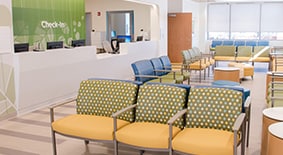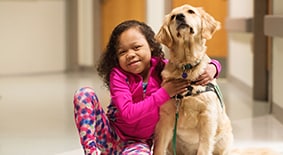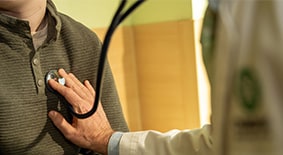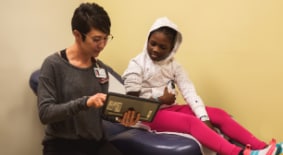Understanding Heart Palpitations in Kids
Heart palpitations are common in kids and adults. The good news is that most of the time, they are completely harmless. However, there are rare cases in which a “racing heart” or palpitation may be a sign of a more serious medical condition. Here are tips to help you determine when it’s time to see a pediatric heart specialist.
Heart Palpitations are the brief sensation that your heart is beating irregularly or more quickly than usual. Some people might describe the feeling of a heart palpitation like a “flutter” or a “skipped beat,” or they may say that their heart is “racing,” “pounding” or “beeping.”
“Kids have their own way to express that there's something going on with their heart rhythm that feels abnormal. If you are unsure of what they are trying to communicate, seeing a pediatric heart specialist can be helpful,” says pediatric cardiologist Robert Whitehill, MD, Medical Director of the Electrophysiology Program at Children’s.

Are Heart Palpitations and Heart Murmurs the Same Thing?
People sometimes think heart murmurs and heart palpitations are the same thing, but they are different. Dr. Whitehill describes a heart murmur as “an extra heart sound” identified by a doctor or caregiver during a physical examination. “In between the typical ‘lub-dub’ heart sounds, there are other subtle sounds that can arise during the cardiac cycle that we would describe as a murmur,” he says. In contrast, a heart palpitation is a sensation felt by the child.
Many parents’ No. 1 question is: “Are heart palpitations dangerous?” In most cases, they are not, according to Dr. Whitehill. “We all have irregularities in our heart rhythm, and the cause is benign a majority of the time,” he says.
Benign Causes of Heart Palpitations
The most common heart palpitation causes in kids are related to emotions, behaviors or lifestyle habits, and may include:
- Stress or anxiety
- Dehydration
- Poor sleep habits
- Strenuous exercise
Another common cause of heart palpitations, especially among teens and young adults, is excess caffeine consumption. Caffeine is a stimulant, and it also makes you more dehydrated, so it can ramp up your heart rate and change your heart’s rhythm. “A lot of the pre-workout drinks and coffee drinks teens like are not only high in caffeine, but also high in sugar. Having one here or there is not a big deal, but certainly having multiple can make your palpitations much worse. This is one of the first things we try to cut out anytime we have a patient who's having issues,” says Dr. Whitehill.
Medical Causes of Heart Palpitations
In rare cases, heart palpitations can be a sign of a more serious heart condition. Your pediatrician may refer you to a pediatric cardiologist who can help rule out the following:
- Arrhythmia: Also known as a heart rhythm disorder, arrhythmia is an abnormality in the electrical system of the heart that causes it to beat too fast, too slow or in an irregular way. Arrhythmias may be congenital, meaning they are present at birth, or they may develop during childhood. Heart rhythm disorders can vary in severity, from mild and undetected to life-threatening.
- Structural heart issues: Less commonly, structural abnormalities—such as congenital heart defects (CHDs) or problems with the heart valves—can cause palpitations.
Children’s Cardiology Appointment Request
To request an appointment, complete the online form. Children’s Cardiology will follow up to schedule your appointment. Call 404-256-2593 to reach the contact center. If your child is experiencing a medical emergency, please call 911.
While parents understandably have concerns, heart palpitations typically resolve on their own. However, there are signs that can help you determine when to see a doctor about heart palpitations. If your child or teen experiences any of the following symptoms, schedule an appointment with your child’s pediatrician or a pediatric heart specialist:
- Recurrent heart palpitations (happening frequently throughout a single day)
- Prolonged heart palpitations lasting more than a few minutes each
- Heart palpitations that occur during or immediately following exercise
- Heart palpitations that worsen suddenly or become more frequent
Seek emergency medical care right away if your child has heart palpitations accompanied by any of the following:
- Fainting
- Severe shortness of breath
- Extreme dizziness or confusion
- Chest pain
- Blue lips
To determine the cause of your child’s heart palpitations, a doctor will do a physical exam and a thorough assessment of their medical history. The doctor will want to know what sensation your child is feeling, how often heart palpitations occur, how long they last and when they typically happen.
Based on this assessment, your child’s doctor may recommend a variety of tests to rule out a heart condition or abnormality as the cause. These tests may include:
- Electrocardiogram (EKG or ECG): This quick, painless test records the heart’s electrical signals.
- Echocardiogram: An ultrasound of the heart is used to assess the heart's structure and function.
- Heart rhythm monitoring: A take-home, wearable device like a Holter monitor can track heart activity over time.
- Exercise stress testing: When heart palpitations occur during exercise, a stress test may be used to evaluate how the heart responds to increased physical activity.
- Electrophysiology (EP) study: This minimally invasive procedure is used to map and analyze the heart’s electrical activity in certain cases of abnormal heart rhythms.
A Spotlight on Our Pediatric Heart Specialties
How Are Heart Palpitations in Kids Treated?
Treatment for heart palpitations depends on the cause. Many children don’t require any treatment at all, especially if the cause is behavioral or emotional.
For cases of heart palpitations that are not caused by an arrhythmia or other heart condition, your doctor may recommend:
- Improving hydration and sleep.
- Reducing caffeine intake.
- Managing stress and anxiety with relaxation techniques or therapy.
If an arrhythmia or other underlying heart condition is diagnosed, treatment options may include:
- Medications to regulate heart rhythm.
- Catheter ablation, a minimally invasive procedure that uses a thin, flexible tube to heat or freeze around the area that is creating an abnormal electrical pathway in the heart.
- Surgical intervention, which may be necessary to repair structural heart problems.
- Implantable devices, such as pacemakers or defibrillators, may be used in severe cases to regulate heart rhythm.
Each child’s treatment and follow-up care will be customized based on the type and severity of their condition.
If your child experiences heart palpitations, it’s normal to feel worried or concerned. Peace of mind comes from knowing they are receiving high-quality care tailored especially for them. At Children’s, pediatric cardiologists are specially trained to diagnose and treat heart conditions in infants, kids, teens and young adults.
“We treat patients from birth to age 22. Young adults, even those in their early 20s, should see a pediatric cardiologist because the health concerns they have are very different from someone who is older, and they require a different approach to care,” says Dr. Whitehill. “Our team is experienced in taking care of young people, and that’s what you want as a parent.”
Growing hearts are unique and require distinctive care. Our team of pediatric heart specialists will help provide your child with:
- Kid-focused care: From diagnostic tools designed for smaller bodies to interacting and communicating in a way that puts kids at ease, our environment and our approach to care is designed especially for children and teens.
- Tailored treatments: Our treatment plans are customized based on your child’s age, diagnosis, symptoms and stage of development. We collaborate across specialties to provide comprehensive care, factoring in how a child’s heart condition and treatment can affect their growth, learning and emotional well-being.
- Coordinated Care: From the time of your child’s first visit, our team will work to provide coordinated care across our System, from infancy through young adulthood. They’ll also assist with referring to an adult cardiologist when the time comes to prevent gaps in treatment if necessary.
Learn About Common Heart Conditions in Kids
Dr. Robert Whitehill is a pediatric cardiologist who serves as the Medical Director of the Electrophysiology Program at the Children’s Heart Center. He specializes in the diagnosis, treatment and management of heart rhythm disorders, as well as invasive electrophysiology studies and device implantation.
This content is general information and is not specific medical advice. Always consult with a doctor or healthcare provider if you have any questions or concerns about the health of a child. In case of an urgent concern or emergency, call 911 or go to the nearest emergency department right away. Some physicians and affiliated healthcare professionals on the Children’s Healthcare of Atlanta team are independent providers and are not our employees.
Contact Us 404-785-KIDS (5437)







